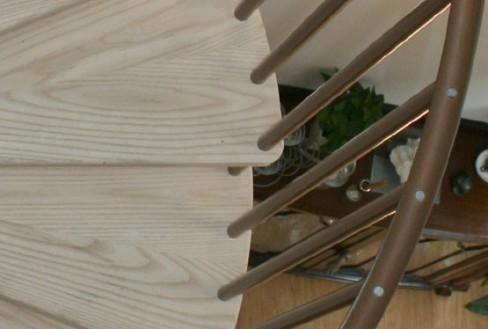During a typical week, we receive many phone calls asking us about whether we supply cast iron staircases? Over the course of the conversation, it usually becomes clear that what they are actually looking for is a traditional design of staircase such as our decorative Victorian spiral staircases or our Georgian style LCC staircases. Cast iron is synonymous with metalwork from these periods as it was relatively cheap and easy to produce. Since then, however, manufacturing has moved on and new materials have become available. When we were deciding what material to produce our staircases from, aluminium was the standout choice.
Lightweight
Cast aluminium is virtually indistinguishable from cast iron, both in terms of look and feel, but it is significantly stronger and lighter. In practice, this means our cast aluminium staircases weigh around a third of cast iron alternatives.
This has plenty of advantages most obviously during the initial installation. Because the staircase is so light, its actually practical to install your own staircase (with a little assistance positioning the larger items such as the handrail). Even if you don’t fancy fitting it yourself, the lighter design will make the whole installation much faster and simpler for your fitter.

Beyond the erection of the staircase itself, the reduced weight also means that upper floor staircases, for areas such as loft conversions, can be fitted without the need for additional steel supports and associated disruption and structural engineering costs. Similarly, when used externally, our cast aluminium staircases do not need the extensive concrete foundations that cast iron requires. This means less time spent digging out the ground and waiting for the concrete to set.
Resilient and weather resistant
Whilst cast iron may conjure up images of highly durable old machinery or kitchen equipment, it is actually quite a brittle metal, due to its high carbon content (around 4%). As such, whilst cast iron has good compressive strength, it can fracture at joints over time if not cared for properly. This is particularly true for external staircases which are exposed to more extreme hot and cold conditions. The cast aluminium we use for our staircases is much less brittle and will stand the test of time.
Another common issue with cast iron metalwork is rust. Over time, cast iron can be vulnerable to corrosion so it is usually necessary to coat it with a water-resistant finish such as paint and to keep this regularly touched up and maintained. Any signs of rust have to be dealt with quickly before they become more serious. In contrast, our cast aluminium staircases offer excellent corrosion resistance and require far less maintenance to keep them looking and performing their best.

Quality control
Above and beyond the advantages that cast aluminium offers as a material, the other major benefit for us is that we own our own non-ferrous aluminium foundry. This gives us complete end-to-end control on our cast aluminium items. We continuously engage with aluminium suppliers to ensure that we are sourcing the best quality material on the market for our staircases. Once the ingots arrive at the foundry, we can completely manage the flow of castings, which means that we can have complete confidence in the quality of our products – delivering the perfect results each time.
If you want to see just how good cast aluminium staircases look in person, come and visit our Derbyshire showroom where our staff will happily show you some of our most popular designs. You can also browse our full range in our gallery and, when you’re ready, send over a quote request for your preferred design.








